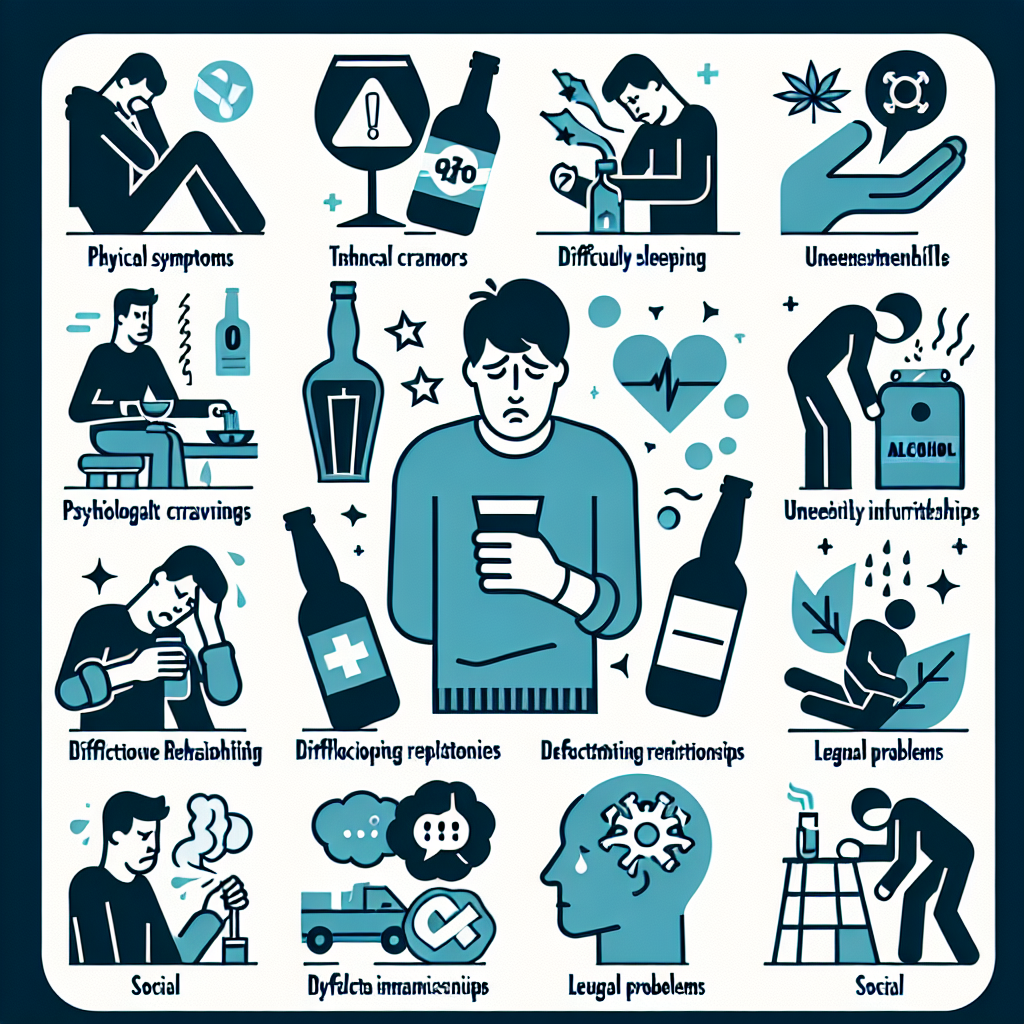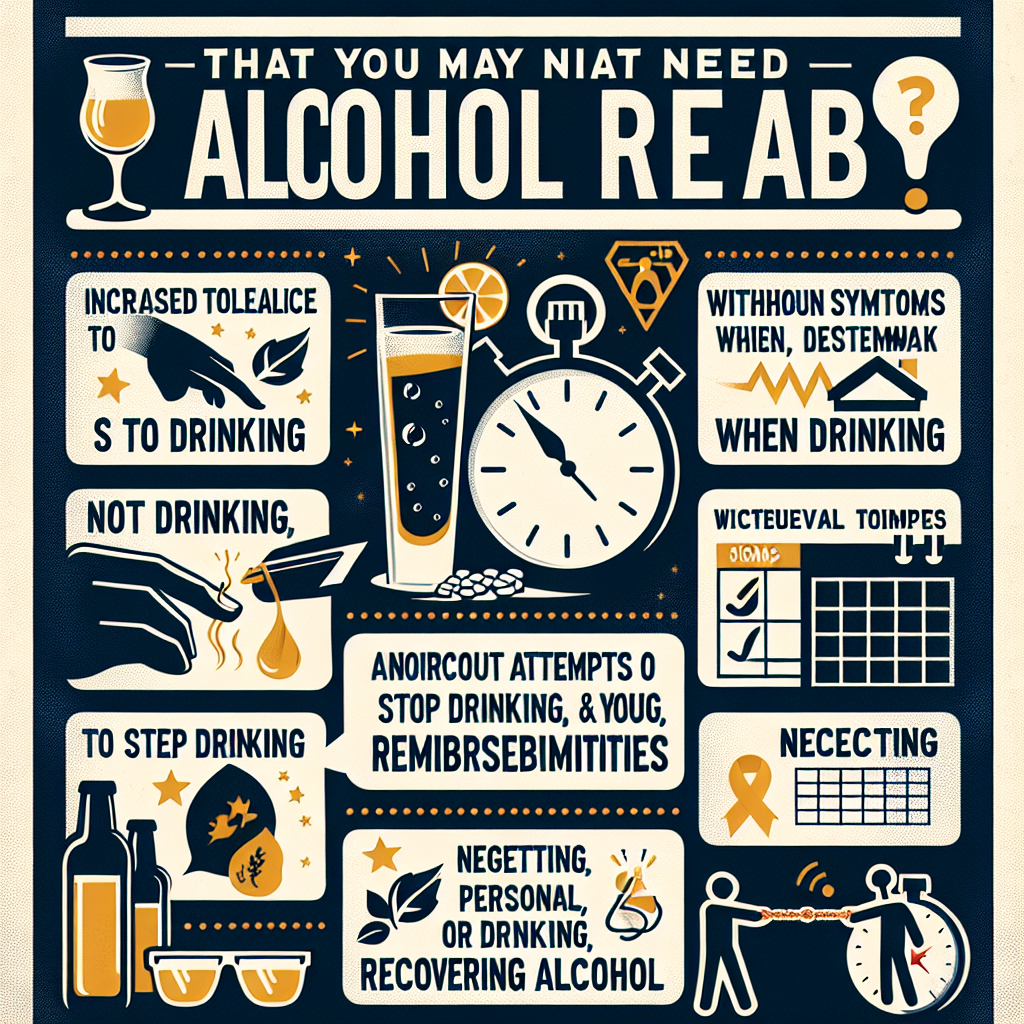-
Table of Contents

“Recognize the Red Flags: When Drinking Takes Control, It’s Time for Rehab.”
Introduction
Recognizing the signs that you may need alcohol rehab is crucial for addressing potential alcohol dependency and seeking appropriate help. Key indicators include an inability to control drinking, experiencing withdrawal symptoms when not drinking, neglecting responsibilities at work, school, or home due to alcohol use, and continuing to drink despite knowing the harm it causes to your health and relationships. Other signs include developing a tolerance, where you need to consume more alcohol to achieve the same effects, and experiencing cravings or strong urges to drink. If you find yourself prioritizing alcohol over other activities and relationships, or if you have tried to cut down or quit drinking but failed, these are strong signals that professional intervention may be necessary. Recognizing these signs early can lead to more effective treatment and a better chance of recovery.
Recognizing The Physical And Emotional Symptoms Of Alcohol Dependency
Recognizing the physical and emotional symptoms of alcohol dependency is crucial for anyone who may be struggling with alcohol use. Understanding these signs can be the first step toward seeking help and embarking on a journey to recovery. Alcohol dependency, often referred to as alcoholism, is a chronic disease characterized by an inability to control drinking despite adverse consequences. It can manifest in various ways, affecting both the body and the mind.
One of the most apparent physical signs of alcohol dependency is an increased tolerance to alcohol. This means that over time, a person needs to consume more alcohol to achieve the same effects they once did with smaller amounts. This increased tolerance can lead to more frequent and heavier drinking sessions, which in turn can cause significant harm to the body. For instance, chronic alcohol consumption can lead to liver damage, cardiovascular problems, and a weakened immune system. Additionally, individuals may experience withdrawal symptoms when they try to cut back or stop drinking. These symptoms can include tremors, sweating, nausea, and even seizures in severe cases.
Beyond the physical symptoms, alcohol dependency also takes a toll on emotional and mental well-being. One of the key emotional signs is a preoccupation with drinking. This can manifest as constantly thinking about the next drink, planning activities around alcohol consumption, or feeling anxious or irritable when alcohol is not available. This preoccupation often leads to neglecting responsibilities at work, school, or home, as the individual prioritizes drinking over other important aspects of life.
Another emotional symptom is the inability to stop drinking despite a strong desire to do so. Many people with alcohol dependency recognize that their drinking is problematic and may even make repeated attempts to quit or cut back. However, they often find themselves unable to maintain these changes, leading to feelings of guilt, shame, and frustration. This cycle of failed attempts can contribute to a sense of hopelessness and despair, making it even more challenging to seek help.
Social relationships also suffer as a result of alcohol dependency. Individuals may become isolated from friends and family, either because they are ashamed of their drinking or because their behavior while intoxicated has strained these relationships. They may also find themselves in legal or financial trouble due to actions taken while under the influence, such as driving while intoxicated or spending excessive amounts of money on alcohol.
Recognizing these signs is the first step toward seeking help and making positive changes. It is important to remember that alcohol dependency is a disease, not a moral failing. Seeking help is a courageous and necessary step toward recovery. There are numerous resources available, including alcohol rehab programs, support groups, and counseling services, all designed to provide the support and tools needed to overcome dependency.
In conclusion, understanding the physical and emotional symptoms of alcohol dependency is essential for recognizing when it is time to seek help. Increased tolerance, withdrawal symptoms, preoccupation with drinking, inability to stop despite wanting to, and strained relationships are all indicators that alcohol rehab may be necessary. Taking the step to seek help is a powerful and inspiring move toward a healthier, more fulfilling life. Remember, recovery is possible, and there is support available every step of the way.
Identifying Behavioral Changes That Indicate The Need For Alcohol Rehab
Recognizing the signs that you need alcohol rehab can be a challenging and often daunting task. However, identifying behavioral changes that indicate the need for professional help is a crucial step towards recovery. One of the first signs to look out for is a noticeable shift in your daily routine. If you find yourself increasingly prioritizing alcohol over responsibilities such as work, family, or personal health, it may be time to consider seeking help. This shift often manifests as frequent absenteeism, declining performance at work, or neglecting household duties.
Another significant indicator is the change in social interactions. You might start isolating yourself from friends and family, preferring to drink alone rather than engage in social activities. This isolation can lead to strained relationships and a sense of loneliness, further exacerbating the problem. Additionally, if you notice that your social gatherings revolve predominantly around alcohol consumption, it could be a sign that your drinking habits are becoming problematic.
Moreover, experiencing mood swings and emotional instability can also be a red flag. Alcohol can significantly impact your mental health, leading to increased irritability, anxiety, or depression. If you find that your mood is heavily influenced by your drinking patterns, it may be an indication that alcohol is taking a toll on your emotional well-being. Furthermore, if you start using alcohol as a coping mechanism to deal with stress, sadness, or other negative emotions, it is a clear sign that you might need professional intervention.
Physical health changes are another critical aspect to consider. Frequent hangovers, blackouts, or memory lapses are not just inconvenient; they are signs that your body is struggling to cope with the amount of alcohol you are consuming. Over time, excessive drinking can lead to more severe health issues such as liver disease, cardiovascular problems, and weakened immune function. If you notice that your physical health is deteriorating and you continue to drink despite these consequences, it is a strong indication that you need help.
Financial difficulties can also be a telling sign. If you find yourself spending a significant portion of your income on alcohol, to the detriment of other essential expenses, it is a clear indication that your drinking habits are out of control. This financial strain can lead to further stress and anxiety, creating a vicious cycle that is hard to break without professional assistance.
Legal issues are another serious indicator. If you have faced legal problems such as DUI charges, public intoxication, or other alcohol-related offenses, it is a sign that your drinking is not only affecting your personal life but also your standing in society. These legal troubles can have long-lasting repercussions, making it even more crucial to seek help.
Lastly, if you have tried to cut down or quit drinking on your own and found it difficult or impossible, it is a strong sign that you need professional help. The inability to control your drinking despite recognizing its negative impact on your life is a hallmark of alcohol dependence.
In conclusion, identifying these behavioral changes is the first step towards acknowledging that you may need alcohol rehab. It is important to remember that seeking help is not a sign of weakness but a courageous step towards reclaiming your life. By recognizing these signs and taking action, you can embark on a journey towards recovery and a healthier, more fulfilling life.
Q&A
1. **Inability to Control Drinking**: Frequently drinking more than intended or being unable to cut down or stop drinking despite wanting to.
2. **Neglecting Responsibilities**: Failing to fulfill major obligations at work, school, or home due to alcohol use.
Conclusion
Signs that you may need alcohol rehab include:
1. Inability to control drinking.
2. Neglecting responsibilities at work, school, or home.
3. Drinking in dangerous situations, such as while driving.
4. Experiencing withdrawal symptoms when not drinking.
5. Developing a tolerance, needing more alcohol to feel the same effects.
6. Continuing to drink despite knowing it’s causing problems.
7. Spending a lot of time drinking or recovering from drinking.
8. Losing interest in activities and hobbies once enjoyed.
9. Experiencing legal or financial problems due to drinking.
10. Having relationship issues related to alcohol use.
If you or someone you know exhibits these signs, it may be time to seek professional help through an alcohol rehab program.



